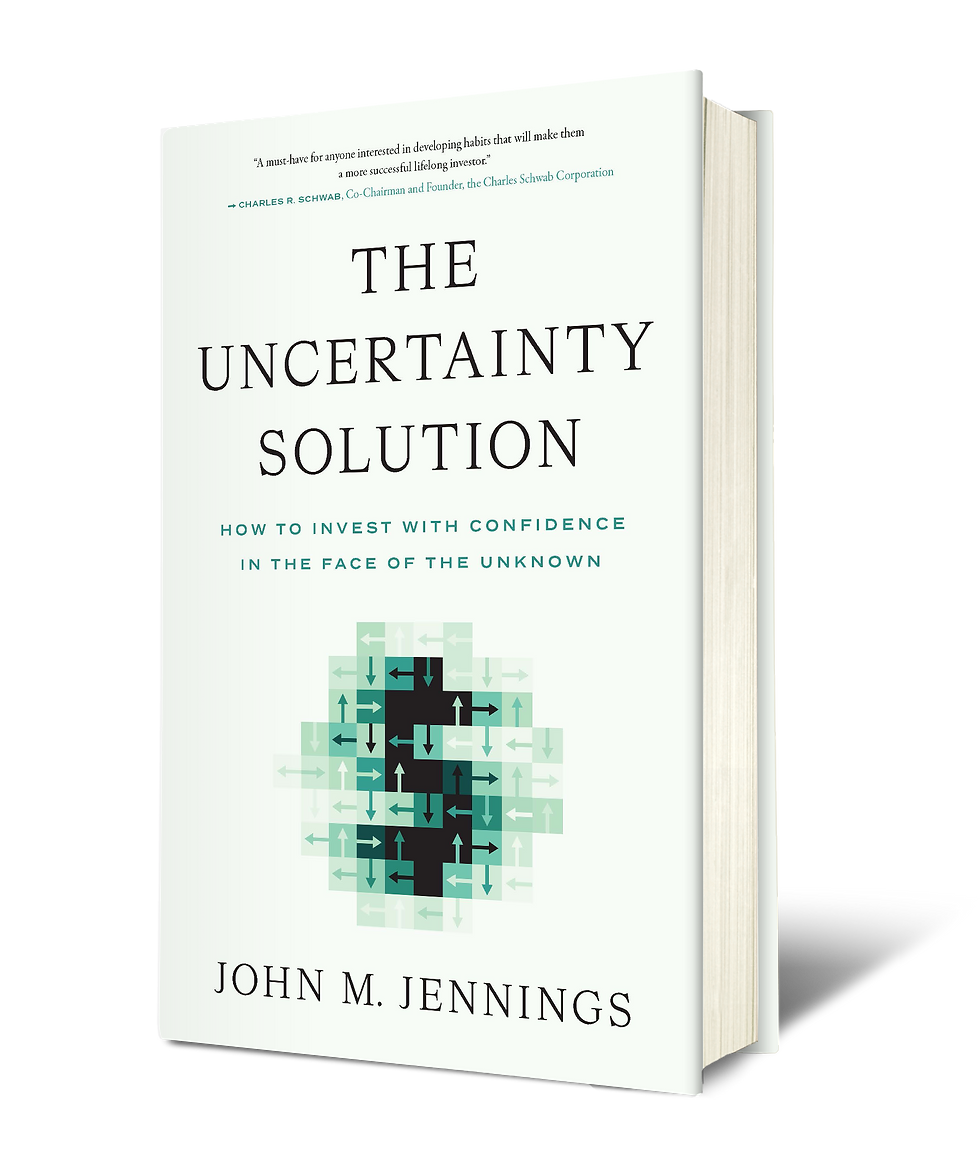The Uncertainty Solution: Challenging Traditional Ideas About Investing
- floydsaunders
- Jul 3, 2023
- 7 min read
By Floyd Saunders, Founder at Really Simple Investing
I have always thought that investing should be easy. I like it when I can keep things as simple as possible. The problem is investing includes a lot of uncertainty and there is a lot of noise out there about investing that is frankly not useful. Investing can be a daunting task, especially in an age of uncertainty.

The quest for certainty in investing is a common theme among investors, but it is also a problem that can lead to poor investment decisions. In this interview with John Jennings, the author of the book, The Uncertainty Solution, you will learn that all of the traditional thinking about investing is wrong. This book and my discussion with John Jennings turns the world of investing upside down. The Uncertainty Solution is challenging traditional ideas about investing and is a book to read if you are an investor.
John Jennings is the president of a $15 billion wealth management firm and an adjunct professor at Washington University’s Olin Business School. He has finance and law degrees from the University of Missouri and a professional certificate in Investment Decisions and Behavioral Finance from Harvard.
The Uncertainty Solution: Challenging Traditional Ideas About Investing
In this podcast interview, we will explore the main themes of John Jennings' book, The Uncertainty Solution, and how they can help investors navigate the complex world of investing. You can listen to the podcast here:
The Quest for Certainty
Humans have a natural tendency to seek patterns and certainty. This is rooted in our evolutionary history, where the ability to spot patterns gave our ancestors a survival advantage. However, this quest for certainty can also be detrimental, especially when it comes to investing.
According to John Jennings, "When we can't spot a pattern, we feel worried or anxious or even it triggers our fight or flight response sometimes. But when we resolve uncertainty, the opposite happens. Our parasympathetic nervous system kicks in. We calm, relax, and even get ahead of dopamine, which creates pleasure. So certainty feels bad. Resolving uncertainty feels good."
"Certainty feels bad resolving uncertainty feels good." - John Jennings
This natural tendency to seek certainty can lead investors to make irrational decisions, such as jumping in and out of the market based on short-term fluctuations. Instead, investors should focus on the long-term and understand that the stock market will fluctuate.
The Problem with Short-Term Thinking
Short-term thinking is a common problem among investors, especially in the age of instant gratification. Investors want to see immediate results, and when they don't get them, they panic and make rash decisions.
"We tend to be more short term in our views and our thinking. The uncertainty makes us feel like we have an existential threat from things like stock market gyrations. We're not really in danger of physical harm, but our bodies react as if we are facing financial harm." - John Jennings
This short-term thinking can lead investors to miss out on long-term gains. Instead, investors should focus on the big picture and understand that investing is a long-term game.
The Importance of Behavioral Finance
Behavioral finance is the study of how human behavior affects financial decisions. It is an important field of study because it helps investors understand why they make certain decisions and how they can make better decisions in the future.
John Jennings has certifications in investment decisions and behavioral finance, and he believes that understanding behavioral finance is critical for investors. He explains, "Behavioral finance is important because it helps us understand how we make decisions. It helps us understand why we make certain decisions and how we can make better decisions in the future."
By understanding behavioral finance, investors can avoid common pitfalls, such as overconfidence, loss aversion, and herd mentality.
The Uncertainty Solution
The Uncertainty Solution is a book that challenges traditional investment strategies and offers a new approach to investing in an age of uncertainty.

The book is based on the premise that uncertainty is a natural part of investing and that investors should embrace it rather than fight it.
According to John Jennings, "The Uncertainty Solution is about embracing uncertainty and using it to your advantage. It's about understanding that uncertainty is a natural part of investing and that there are ways to navigate it successfully."
The book offers practical advice on how to navigate uncertainty, such as focusing on the long-term, diversifying your portfolio, and avoiding short-term thinking.
Beware of Experts
In his book, John Jennings cautions investors to beware of experts and burying predictions. He believes that experts, such as economists and financial analysts, can be unreliable in predicting market behavior. He cites Warren Buffett's criticism of analyst reports as useless and advises investors to focus on their own research and analysis.
The Importance of Inactivity
Inactivity is a key principle of The Uncertainty Solution. John Jennings explains that investors should avoid making too many trades, as they tend to lose money on every trade. He cites a study that found that both genders, regardless of marital status, were equally as bad in making investment moves. In general, every time one of these investors sold something and bought something else, what they bought did worse than what they sold.
"So in other words, every time they traded, on average, they lost money over the long term," - John Jennings.
The reason why males underperform females is because they were more overconfident. The females, on the other hand, were more likely to seek help from a professional financial advisor, which helped them avoid common pitfalls.
The Stock Market is not the Economy
The stock market is not a predictor of economic changes, but rather a reflection of the collective expectations of investors. Economic indicators are not always accurate predictors of stock market behavior, as demonstrated by the rapid rebound of the stock market in 2020 despite dire economic predictions.
Jennings explains, "The stock market made up of all of us, including retail investors. It's not like we're predicting what's going to happen in the stock market. The stock market is foreshadowing what's going to happen in the economy and it's not always right. So the Nobel Prize winning economists quip that the stock market has predicted nine of the last five recessions. So it's an ish like it's not perfect, but if there's going to be a turn either from the market going up or from the market bottoming and coming back down, it's going to happen in advance of the economic news."
The Potential Impact of Embracing Uncertainty
The implications of embracing uncertainty in investing are significant. By understanding that uncertainty is a natural part of investing, investors can avoid making rash decisions based on short-term fluctuations. Instead, they can focus on the long-term and make informed decisions based on their investment goals.
John Jennings explains that when we feel uncertain, we have a need for cognitive closure, which can lead to seizing and freezing. "We seize on pretty much the first explanation that fits our worldview. So now we feel good because now we feel like we have the world that makes sense. We have an explanation, or we attribute a cause to something, and oftentimes it may be a wrong explanation, maybe we think we've seen a pattern, and it's really just rain of noise, but we seize on it. And then what happens is we freeze, which is we don't want to readdress or have our conclusions or explanations challenged because we don't want to experience that uncertainty again."
By embracing uncertainty, investors can avoid seizing and freezing and make more informed decisions based on the facts and data available to them.
"The solution is to accept the fact that uncertainty is inherent and it's going to be with us and that the future is inherently unknowable." - John Jennings
The potential impact of embracing uncertainty is also significant. By embracing uncertainty, investors can achieve better returns over the long-term. They can also avoid common pitfalls, such as overconfidence and herd mentality, which can lead to poor investment decisions.
Where should you invest then? Mr. Jennings takes the typical retail investor back to the now classic advice from Warren Buffett: "Warren Buffett is familiar, as we quoted as saying, that the average retail investor should invest in the S and P 500 index fund for their lifetime and his favorite holding period is forever." - John Jennings.
About the Book:
This is not your typical investment book. It is a guide to cultivating the mindset and behavior necessary to weather inherently uncertain and unpredictable markets. It doesn’t just tell you how to invest but how to think better about investing. What is really useful is how the author references studies on psychology, decision making, and investment behavior, to provide a no-nonsense analysis of the financial markets and a road map to navigating the twists and turns of investing.
Jennings uses mental models to create a latticework of wisdom that will help you evaluate investment advice and learn better behavior in the face of uncertainty. To name a few: ignore expert predictions, be wary of stories, and try to invest like a dead person.
This book is an engaging dive into investing psychology and best practices, The Uncertainty Solution is an authoritative, accessible guide for both lay investors and professionals inundated with financial news and data. I think this is a book every investor will want to read in order to improve your thinking about investing, practice better investment behavior, and ultimately, have more money in your investment accounts.
Conclusion and Future Outlook
In conclusion, investing in an age of uncertainty requires a different approach than traditional investment strategies. The Uncertainty Solution offers a new approach to investing by embracing uncertainty and using it to your advantage. By focusing on the long-term, understanding behavioral finance, and avoiding short-term thinking, investors can make informed decisions and achieve better returns.
The future outlook for investing in an age of uncertainty is promising. As more investors embrace uncertainty and focus on the long-term, the potential for better returns and avoiding common pitfalls will increase. However, it is important to remember that investing is a long-term game and requires patience and discipline. By following the principles outlined in The Uncertainty Solution, investors can navigate the complex world of investing and achieve their investment goals.

































Comments